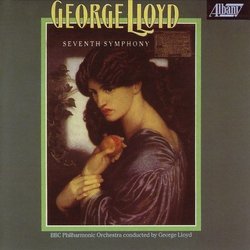| All Artists: George Lloyd, BBC Philharmonic Orchestra Title: George Lloyd: Seventh Symphony Members Wishing: 0 Total Copies: 0 Label: Albany Records Release Date: 8/13/1993 Genre: Classical Styles: Historical Periods, Modern, 20th, & 21st Century, Symphonies Number of Discs: 1 SwapaCD Credits: 1 UPCs: 034061005728, 003406100572 |
Search - George Lloyd, BBC Philharmonic Orchestra :: George Lloyd: Seventh Symphony
CD Details |
CD ReviewsHalf of this world and half not Rodney Gavin Bullock | Winchester, Hampshire Angleterre | 10/26/2001 (5 out of 5 stars) "Lloyd is best known for his cycle of twelve symphonies and the 7th is a fine example. He once had the feeling of 'having one foot on this earth and another somewhere else - wherever that may be'. He related this experience to the myth of Proserpine (Persephone) who was partly of this world and partly queen of the underworld.The first movement represents Persephone dancing. It starts nocturnally and the xylophone beats out repeated notes, the metallic sound suggesting a hammer on an anvil. It recurs throughout the movement and at the end of the symphony. The music becomes more radiant and the dancing of Persephone is represented by a delightful waltz tune. These elements, together with a rhythmic horn figure, make up the main material. This is all worked out and the mood is predominately sunny though there are darker moments. The ending is announced by the xylophone's repeated notes and return of the nocturnal mood. The movement ends with a radiant major chord.The second movement is prefaced by a quotation from Swinburne's poem, 'The Garden of Proserpine': Pale beyond porch and portal/Crowned with calm leaves, she stands/ Who gathers all things mortal/With cold immortal hands. The music begins with a long, wistful tune on the cellos. This develops, with increasingly complex orchestration and later woodwind bird calls can be heard. After, a beautiful and noble theme appears, initially on the brass. Towards the end, a falling motif in the woodwind recalls the famous one from Strauss's Rosenkavalier.The final movement is prefaced by another Swinburne poem: And all the dead years draw thither,/And all disastrous things;/ Dead dreams that snows have shaken,/Wild leaves that winds have taken,/Red strays of ruined springs. The movement begins violently with a blow on the tam- tam and an apocalyptic theme follows. Of the other two themes, one is a more lyrical tune and the other is slightly jazzy. In the middle, the music becomes quiet and resigned, even lachrymose, passes to agitation and slides to a mysterious and beautiful end. The xylophone returns, intermittent now and not continuous, and is the last sound we hear. This is fine music but does it fit the profound hopelessness of the poem?The performance by the BBC PO, under the composer, is exemplary, as is the recording. The notes are by George Lloyd and are very brief." Is it finally Lloyd's time? Ryan Morris | Chicago, IL | 07/25/2007 (5 out of 5 stars) "After lifelong persecution by Boulez and his selfsame band of talentless, anti-melodic, overly academic hacks-George Lloyd is emerging as one of the post-WWII era. Unfortunetly, LLoyd died first and was only only to feel the first vibrations of the turn away from Bouleziam and see his works(the eighth specifically was played on the BBC and England was in awe that a composer of such talent and beauty was still alive and...composing!)
I feel that, despite the fame that the eighth initiated, the seventh symphony is better overall. It is a piece composed around Lloyds attempted opera Persephone. This version is the ideal one, perhaps the only one. If you want to get to know this truly great modern and inspired composer---Symphony 5---Cello Concerto(one of the greatest of all time-the best in the genre since Dvorak or Elgar. Check out review on ClassicsToday if you would like more opinions of other works." |

